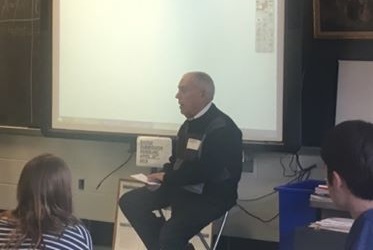UMD sports journalism professor speaks to journalism classes

Former assistant sports managing editor of the Washington Post George Solomon spoke to Journalism classes Feb 14. He focused on how to cover sports journalism and the sacrifices needed to become successful. Photo by Eric Neugeboren.
February 16, 2018
George Solomon, former sports editor of The Washington Post and current sports journalism professor at the University of Maryland, visited journalism classes Feb. 14. He discussed the steps to succeeding as a journalist, stressing the importance of hard work.
Solomon opened the discussion by emphasizing the most important trait of a successful journalist: reading. In order to cover a story effectively, one has to be a citizen of the world and follow the coverage of current events, he said.
“Even if you’re not a political junkie, you should follow the coverage in The New York Times and The Washington Post to see what’s going on and how the president is covered,” Solomon said. “You have to see how people cover the news.”
Solomon joined the Washington Post in 1972 as a columnist after working at the NCAA and Fort Lauderdale Sun Sentinel following his college graduation in 1963; he was then promoted to assistant managing sports editor in 1975. In 2003, he accepted a position as a sports journalism professor at the Philip Merrill College of Journalism at the University of Maryland and began serving as director of The Shirley Povich Center for Sports Journalism at UMD when it was founded in 2011.
Solomon provided journalism students advice on how to cover sports when politics and race issues are involved, referring to the coverage of Colin Kaepernick’s decision to kneel as an example.
“Sports and politics are intertwined,” Solomon said. “Most editors will say what [Kaepernick] did and the subsequent movements, such as Black Lives Matter and the kneeling across athletics, are part of the 2017 football season, if not the most important part of it. As journalists, you have to know what he was kneeling about. You have got to be able to read and understand what he was objecting to and what happened to him.”
Additionally, Solomon expressed the importance of commitment in the journalism industry. As a reporter and editor, Solomon began working at 10 a.m., didn’t leave until 9 p.m. and rarely ate dinner with his family. If someone wishes to pursue a career as a journalist, he said, they shouldn’t expect to maintain a large group of friends since news often pops up on weekends.
“There’s a story about a famous author who was a rookie journalist at one of the Washington newspapers back in the day where he never got a chance to prove himself,” Solomon said. “He was hanging around on the weekend, and there was a huge fire, so he got to cover the fire. He wrote the devil out of it and he got a full time job. If you’re there, stuff happens.”
Sophomore Isabel Hoffman appreciated learning about what it takes to become a journalist and noted that hard work pays off in her journalism stories.
“You can’t just dabble in journalism–you need to really be focused and committed,” Hoffman said. “It is a huge commitment, and it’s important that you love it because that will reflect in your work.”









